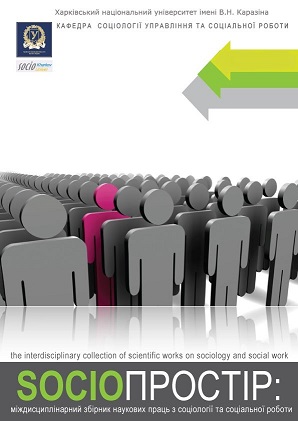Professional burnout of social work experts under the conditions of the marital law
Abstract
The article examines one of the acute problems in the activities of social work specialists - the syndrome of professional burnout. Attention is focused on determining its negative consequences for the personality of the specialist, organization and clients of social work. The increase in the manifestations of burnout under the influence of a complex of external factors is substantiated (a large flow of new obligations, information and action algorithms that change, an increase in the number of clients, work under constant stress and fear for one's own life and the lives of loved ones, etc.). Based on the analysis of the results of the empirical research (structured interviews conducted with heads of social services, public organizations and charitable foundations within the scientific topic of the Department of Sociology of Management and Social Work of Kharkiv National University named after V. N. Karazin «Actual directions of management of social services»), the characteristics of the manifestations of the syndrome of professional burnout of social workers during the period of martial law in Ukraine are determined: 1) increased workload on employees, 2) psychological overload, 3) increased stress due to military actions, 4) decreased motivation. The authors of the article consider the methods and programs of prevention and overcoming the negative consequences of the syndrome of professional burnout of specialists as a component of the organization's management and the manager's managerial task. Common practices for preventing emotional burnout in organizations are analyzed: supervision, self-management skills, stress resistance and recovery after psychological shocks, etc. By applying the method of content analysis of the materials of the public organizations sites, programs and projects aimed at providing assistance to specialists in social work were characterized.
The article concludes about the need to develop own special programs in organizations and use external resources to provide the necessary support, training and preservation of the health and emotional balance of specialists, which should remain a priority task for the manager.
Downloads
References
/References
Ridkodubska, H. А. (2020). Professional burning out of social works. Herald of Zaporizhzhia National University. Pedagogical Sciences, 1 (34), 266-271.
Maksimenko, S. D., Karamushka, L. M., Zaychikova, T. V. (2004). The syndrome of «professional burnout» and the professional career of employees of educational organizations: gender aspects. Kyiv: Millennium.
Yatsenko, L. V., Perkhailo, N. A. (2021). Gender features of social work specialists’ professional burnout. Habitus, 25, 27-31.
Hlavatska, O. (2019). Social workers’ professional burnout prevention and overcoming. Scientific bulletin of Uzhgorod University. Series: «Pedagogy. Social work», 2 (45), 41-45.
Vasylyk, A., Doda, O. (2019). Professional fatigue: factors, consequences and employers responsibility of the work capacity maintaining of employees. Scientific notes of the Tavra National University named after V. I. Vernadskyi. Series: Economics and management. 30 (69), № 3, 130-135.
Yevdokymova, I., Butylina, О. (2019). Professional and personnel risks in social work. Scientific and Theoretical Almanac Grani, 22(2), 23-31. Retrieved from https://doi.org/10.15421/171918
Butylina, O., Radchenko, N. (2020). Development of soft skills as a factor of improving the efficiency of social workers. «SOCIOPROSTIR: the interdisciplinary online collection of scientific works on sociology and social work», (9), 53-60. Retrieved from https://doi.org/10.26565/2218-2470-2020-9-07
Skoryk, T. V. (2011). Prevention of the syndrome of «professional burnout» of social workers as a necessary condition for professional readiness. Scientific notes of the Nizhyn State University named after Mykola Gogol. Series: Psychological and pedagogical sciences, 3, 98-100.
Maschak, S. O. (2012). Professional burnout of a personality as a sociopsychological problem. Scientific bulletin of the Lviv State University of Internal Affairs : psychological series, 2(1), 444-452.
Voznyuk, N. V. (2015). Professional burnout of social sphere specialists. Social work in Ukraine: theory and practice, 1-4, 167-176.
Public organization «Forpost». Retrieved from https://forpost-center.org/pro-nas/strategiya/
International рublic organization «International Center for Development and Leadership». Retrieved from https://ildc.org.ua/proyekt-nadannya-sotsialno-psyhologichnoyi-pidtrymky-ta-dopomogy-naselennyu-pid-chas-vijny/
Рідкодубська Г. А. Професійне вигорання соціальних працівників. Вісник Запорізького національного університету. Педагогічні науки. 2020. № 1 (34). С. 266–271.
Синдром «професійного вигорання» та професійна кар’єра працівників освітніх організацій : гендерні аспекти : навч. носіб. для студ. вищ. навч. закл. та слухачів ін-тів післядипломної освіти / за наук. ред. С. Д. Максименка, Л. М. Карамушки, Т. В. Зайчикової. Київ : Міленіум, 2004. 264 с.
Яценко Л. В., Перхайло Н. А. Гендерні особливості професійного вигоряння фахівців із соціальної роботи. Габітус. 2021. Вип. 25. С. 27–31. https://doi.org/10.32843/2663-5208.2021.25.4.
Главацька О. Л. Попередження та подолання професійного вигорання соціальних працівників. Науковий вісник Ужгородського національного університету. Серія: Педагогіка. Соціальна робота. 2019. Вип. 2 (45). С. 41–45.
Василик А. В., Дода О. Д. Професійна втома: чинники, наслідки та обов’язки роботодавців щодо відновлення працездатності працівників. Вчені записки ТНУ імені В. І. Вернадського. Серія: Економіка і управління. 2019. Том 30 (69). №3. С. 130–135.
Євдокимова І. А., Бутиліна О. В. Професійні та кадрові ризики в соціальній роботі. Науково-теоретичний альманах «Грані». 2019. Т. 22. № 2. С. 23–31.
Бутиліна О., Радченко Н. Розвиток soft skills як чинник підвищення ефективності діяльності соціальних працівників. SOCIOПРОСТІР. 2020. № 9. C. 38–45. https://doi.org/10.26565/2218-2470-2020-9-07
Скорик Т. В. Профілактика синдрому «професійного вигорання» соціальних працівників як необхідна умова професійної готовності. Наукові записки Ніжинського державного університету ім. Миколи Гоголя. Серія : Психолого-педагогічні науки. 2011. № 3. С. 98–100.
Мащак С. О. Професійне вигорання особистості як соціально-психологічна проблема. Науковий вісник Львівського державного університету внутрішніх справ. Cерія психологічна. 2012. Вип. 2(1).
С. 444–452. URL: http://nbuv.gov.ua/UJRN/Nvldu_2012_2(1)__54 (дата звернення: 03.11.2022).
Вознюк Н. В. Професійне вигорання фахівців соціальної сфери. Соціальна робота в Україні: теорія і практика. 2015. № 1-4. С. 167–176. URL: http://nbuv.gov.ua/UJRN/srutip_2015_1-4_22 (дата звернення: 10.11.2022).
Сайт Громадської організації «Форпост». URL: https://forpost-center.org/pro-nas/strategiya/ (дата звернення: 10.11.2022).
Сайт МГО «Міжнародний цент розвитку і лідерства». URL: https://ildc.org.ua/proyekt-nadannya-sotsialno-psyhologichnoyi-pidtrymky-ta-dopomogy-naselennyu-pid-chas-vijny/ (дата звернення: 10.11.2022).

